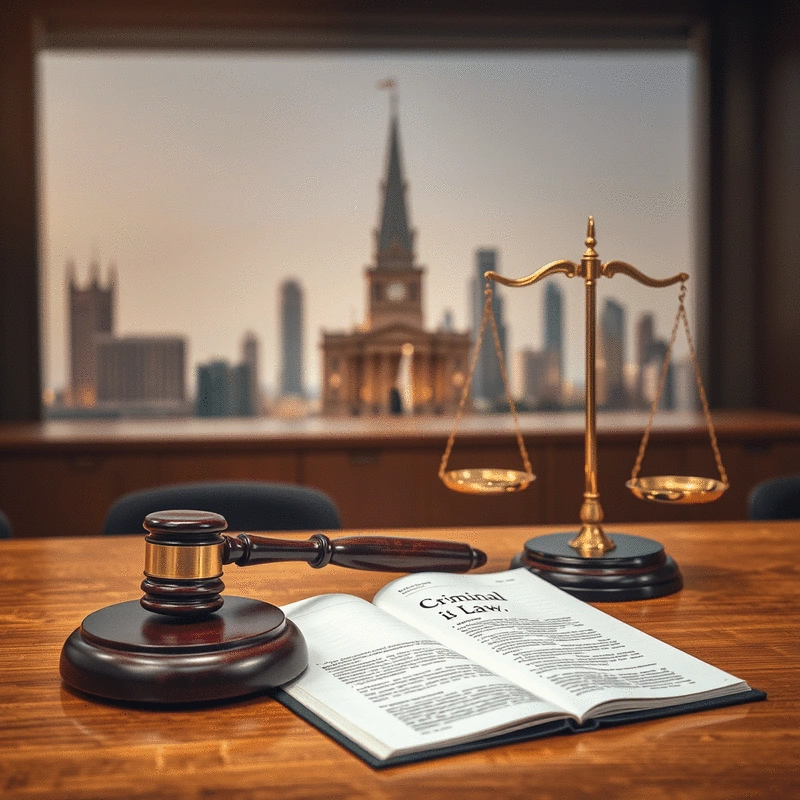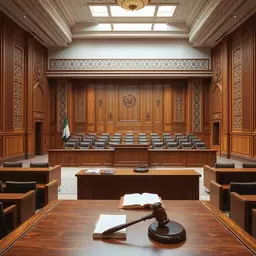Criminal Defense Strategies in UAE

Understanding the legal intricacies within the UAE can be a daunting task, especially for expats. Grasping the interplay between federal laws and Sharia principles is essential for anyone navigating this unique criminal justice system. Here’s what you’ll take away to empower your legal journey in the UAE.
What You Will Learn
- The UAE’s criminal justice framework is shaped by a blend of federal laws and Sharia principles, influencing legal proceedings significantly.
- Federal laws apply uniformly across the UAE, but local laws can vary by emirate, making it crucial to understand local legal nuances.
- Key institutions include the Federal Court System, Public Prosecution, and Sharia Courts, each playing a vital role in law enforcement and justice.
- Understanding bail procedures and court hearing expectations is essential for expats to navigate pre-trial processes confidently.
- After a trial, knowing the appeals process and its requirements can be critical for those seeking to challenge a verdict.
- Developing tailored legal strategies with the help of specialized defense lawyers can significantly impact the outcome of criminal cases.
- Accessing legal aid and ongoing support resources is vital for expats facing legal challenges in the UAE.
Pre-Trial vs. Post-Trial Processes
Understanding the key distinctions between pre-trial and post-trial processes can significantly impact your legal strategy.
Pre-Trial Processes
- Bail granted based on severity
- Judges have discretion
- Preparation for court hearings
Post-Trial Processes
- Appeals must be filed promptly
- Consultation with legal experts is crucial
- Grounds for appeal include procedural errors
Key Considerations in Pre-Trial
- Gather all necessary documentation
- Consult with legal experts
- Practice court appearance
Post-Trial Considerations
- Stay informed about appeal deadlines
- Prepare for a lengthy process
- Work closely with your legal representation
Understanding the UAE Criminal Justice Framework
The UAE's criminal justice framework is a unique blend of modern laws and traditional influences. As we navigate through this framework, it’s important to grasp how the interplay between federal laws and Sharia principles shapes legal proceedings in the UAE. Understanding this will help empower individuals to make informed decisions, especially when facing legal challenges.
Have you ever considered how the legal environment affects your rights? Knowing the structures in place can help demystify the process. With this in mind, let’s dive deeper into the structure of criminal law in the UAE.
The Structure of Criminal Law in the UAE
Criminal law in the UAE is primarily governed by a mix of federal statutes and local laws. The federal laws aim to create a cohesive legal framework, while local laws cater to specific emirate needs. This duality can sometimes make the legal landscape seem complex, but it’s designed to balance modern governance with cultural values. For comprehensive details on specific litigation procedures, you can refer to the official UAE government portal on criminal cases.
Furthermore, the influence of Sharia law is significant, especially in personal status matters. This means that understanding the nuances of both legal systems is vital for anyone involved in a criminal case. Here are some key points to remember:
- Federal laws apply across the UAE, covering a wide range of offenses.
- Local laws may vary in different emirates, affecting specific legal interpretations.
- Sharia plays a role in certain criminal matters, especially those relating to morality and family.
Overview of Federal Laws and Sharia Influence
The federal laws in the UAE include the Penal Code and various federal laws addressing specific crimes. These laws are structured to ensure justice while reflecting the values of Emirati society. By contrast, Sharia law influences areas such as personal conduct and family law, guiding the moral fabric of the nation.
For example, offenses related to alcohol consumption and drug possession often have significant penalties influenced by Sharia principles. This diverging legal landscape emphasizes the importance of understanding both systems. Here’s how they interconnect:
- Federal laws establish the framework for criminal prosecution.
- Sharia influences decisions on moral conduct violations.
- Understanding both is essential for effective legal defense.
Key Institutions in the UAE Legal System
Knowing the main institutions in the UAE legal system can significantly enhance your understanding of how justice is served. These institutions ensure that laws are enforced and that individuals’ rights are preserved. Some of the key institutions include:
- The Federal Court System: Responsible for upholding federal laws.
- The Public Prosecution: Acts on behalf of the state to prosecute criminal offenses.
- The Police: Investigate crimes and enforce laws.
- The Sharia Courts: Handle cases involving personal status and morality issues.
By familiarizing yourself with these institutions, you can better navigate the legal processes in the UAE. Each plays a crucial role in ensuring fairness and transparency in the justice system.
UAE Penal Code: Key Provisions
The UAE Penal Code serves as the cornerstone of criminal law in the country. It outlines various offenses and their corresponding penalties, making it essential for anyone facing charges to understand its provisions. Some key aspects include:
- Definition of Offenses: Clear categorization of crimes such as theft, assault, and drug offenses.
- Penalties: Ranging from fines to imprisonment, dependent on the severity of the crime.
- Legal Rights: Rights of the accused are protected throughout the legal process.
For a detailed understanding of the laws governing crimes and penalties, you can refer to the official UAE Federal Decree-Law No. (31) of 2021 on the Promulgation of the Crimes and Penalties Law. Additionally, the Federal Decree-Law No. 34 of 2021 on Combating Rumours and Cybercrimes provides critical information on digital offenses. For anyone navigating the legal system, being aware of these key provisions can make a significant difference in understanding potential outcomes. As we’ll explore further, a solid defense strategy begins with knowing the law!
Pro Tip
Did you know? Engaging a local legal expert who understands both federal laws and Sharia principles can significantly enhance your defense strategy. Their insights can help you navigate the complexities of the UAE's legal landscape, ensuring that your rights are protected and that you are fully informed throughout the legal process.
Addressing Common Concerns for Expats in UAE Criminal Cases
As an expat in the UAE, navigating the criminal justice system can be daunting. You're likely wondering about the processes and rights you have in case of legal issues. It’s crucial to understand that being informed can significantly alleviate some of the stress associated with potential criminal charges. In this section, we’ll tackle common concerns about pre-trial and post-trial processes, which can help make your journey a bit smoother.
Understanding Pre-Trial Processes
Knowing what to expect during the pre-trial phase is essential for expats. One of the first things you might encounter is the bail procedure. Understanding how bail works and its implications can help you make informed decisions. Here are a few key points about bail in the UAE:
- Bail is typically granted based on the severity of the crime.
- Judges have discretion over bail decisions, so outcomes can vary.
- Not all charges allow for bail, especially serious crimes.
Preparing for court hearings is another critical aspect of the pre-trial process. Knowing what to expect can ease anxiety and help you feel more confident. Here’s a brief overview of what you should keep in mind:
- Arrive early to avoid any last-minute issues.
- Dress appropriately, as this reflects respect for the court.
- Be ready to present your case clearly and calmly.
Pre-Trial Strategies UAE: Key Considerations
Developing a solid pre-trial strategy is important for your case. Consider the following strategies to strengthen your position:
- Consult with a qualified legal expert who understands the UAE legal landscape.
- Gather all necessary documentation and evidence to support your case.
- Practice your court appearance with your lawyer to ensure clarity.
Post-Trial Considerations and Appeals
After a trial, understanding the next steps is crucial for expats. If you believe a legal error may have affected your case, you can consider an appeal. The appeal process in the UAE can be intricate, so it’s essential to grasp the main components:
- Appeals must be filed within a specific time frame after the verdict.
- Not all cases are eligible for appeal, so consulting a legal expert is key.
- Grounds for appeal can include procedural errors or misinterpretation of the law.
Resources for Ongoing Legal Support
Accessing the right resources can significantly help post-trial. Here are some avenues for ongoing legal support:
- Legal aid services for those who may qualify.
- Community forums for expats to share experiences and advice.
- Legal consultants who specialize in appeals and post-trial processes.
UAE Appeals Process: Navigating Post-Trial Challenges
Navigating the appeals process can be complex. To ensure a smoother experience, consider the following:
- Work closely with your legal representation for guidance.
- Stay informed about deadlines and required documentation.
- Be prepared for the possibility of a lengthy process.
Frequently Asked Questions (FAQs)
- Q1: What is the primary framework of criminal law in the UAE?
- A1: The UAE's criminal law is a blend of federal statutes and local laws, heavily influenced by Sharia principles, especially in matters of morality and personal status.
- Q2: Do federal laws apply differently across the various emirates?
- A2: Federal laws generally apply uniformly across the UAE, but local laws can vary by emirate, leading to differing interpretations and specific legal nuances depending on the location.
- Q3: What are the key institutions involved in the UAE legal system?
- A3: Key institutions include the Federal Court System (upholding federal laws), the Public Prosecution (prosecuting criminal offenses), the Police (investigating crimes), and the Sharia Courts (handling personal status and morality issues).
- Q4: How does bail work in the UAE criminal justice system?
- A4: Bail is typically granted based on the severity of the crime, with judges having discretion over decisions. Not all charges allow for bail, especially for serious offenses.
- Q5: What should expats do if they need to appeal a verdict in the UAE?
- A5: Appeals must be filed within a specific timeframe. It's crucial to consult a legal expert to determine eligibility and grounds for appeal, which often include procedural errors or misinterpretations of the law.
Summarizing Effective Criminal Defense Strategies in the UAE
In summary, understanding the nuances of the UAE criminal justice system is vital for expats. By being aware of pre-trial and post-trial processes, you can better navigate any legal challenges that arise. Always remember, having an informed legal strategy tailored to your situation can make a significant difference!
The Importance of Tailored Legal Strategies
Each case is unique, and so should be the legal strategies employed. Expats must consider personalized approaches when facing criminal charges in the UAE.
- Each legal issue demands specific knowledge of local laws.
- Engaging with a specialized defense lawyer can provide essential insights and guidance.
- Fostering communication with your legal team is crucial for success.
Call to Action: Seeking Legal Expertise in Criminal Defense
Are you or someone you know facing a legal challenge in the UAE? Don’t navigate this complex landscape alone. Contact experienced defense attorneys in Dubai who can provide the expert guidance you need!
How to Contact Experienced Defense Attorneys in Dubai
You can reach out to reputable law firms in Dubai, including our team at UAE Criminal Defense Insights. We’re dedicated to helping you understand your rights and options during this challenging time.
Offering Initial Consultations: Next Steps for Defendants
Many attorneys offer initial consultations to discuss your case. This first step can provide valuable insights and set you on the right path. Take advantage of this opportunity!
Legal Aid in UAE: Resources for Defendants
Remember that legal aid resources are available for those who may need assistance navigating the complexities of the UAE legal system. Don’t hesitate to seek help—knowledge is power!
Recap of Key Points
Here is a quick recap of the important points discussed in the article:
- The UAE criminal justice framework blends federal laws with Sharia principles, affecting legal proceedings.
- Understanding the structure of criminal law is vital, as federal laws apply nationwide while local laws can differ between emirates.
- Key institutions include the Federal Court System, Public Prosecution, Police, and Sharia Courts, all of which play essential roles in the legal process.
- The UAE Penal Code outlines offenses and penalties; awareness of these provisions is crucial for anyone involved in legal matters.
- Expats should familiarize themselves with pre-trial and post-trial processes, including bail procedures and appeals.
- Tailored legal strategies are essential for effective defense, highlighting the importance of consulting with legal experts.
Popular Posts
 Understanding the intricacies of the criminal defense trial in the UAE can significantly impact your
Understanding the intricacies of the criminal defense trial in the UAE can significantly impact your
 Understanding the complexities of the legal system can be daunting, especially when facing criminal
Understanding the complexities of the legal system can be daunting, especially when facing criminal
 Understanding your legal rights is not just important; it's essential for anyone navigating the comp
Understanding your legal rights is not just important; it's essential for anyone navigating the comp
 As financial crimes continue to evolve, understanding their implications is crucial for navigating t
As financial crimes continue to evolve, understanding their implications is crucial for navigating t
